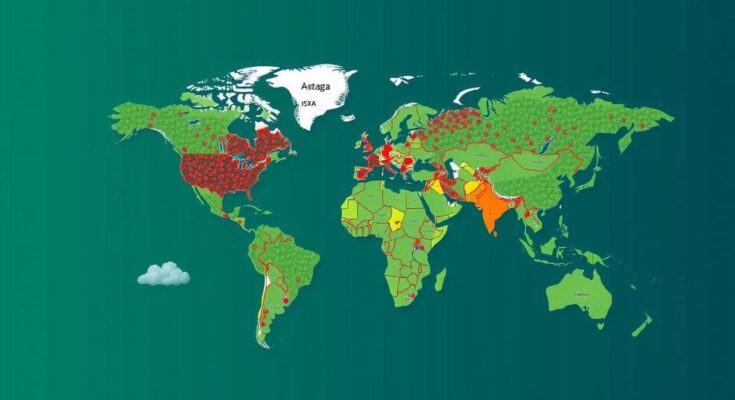The 2024 election year reveals an alarming decline in global commitment to climate action despite escalating climate crises. Political leaders advocating climate skepticism have gained power while pressing issues like inflation overshadow environmental priorities. The Cop29 summit showcases a lack of serious engagement from world leaders. Experts caution that without renewed focus on climate concerns, progress remains stagnant, posing risks to future initiatives.
The year 2024, projected as the most significant election year in history, has highlighted a concerning phenomenon: a diminishing commitment to combat the climate crisis across various nations. Despite alarming climate events and unprecedented global temperatures, many countries, particularly advanced economies, have seen a shift in public and political focus away from environmental issues. Prominent political figures, such as Donald Trump and Vladimir Putin, have gained support while advocating for climate skepticism, furthering the perception that climate action is a low priority. This trend emerges amidst ongoing challenges posed by inflation, geopolitical conflicts, and a rise in populist leaders, leading to an overall erosion of climate prioritization in electoral agendas.
The political landscape has experienced significant upheaval, with right-wing parties gaining traction in EU elections by opposing costly climate initiatives. The 2024 elections have witnessed climate-related concerns taking a backseat to pressing economic issues, positioning the Green New Deal as a political threat. Activist momentum appears to have waned since the peak mobilization around figures like Greta Thunberg, particularly as the backdrop of the pandemic and subsequent crises have overshadowed environmental priorities. Notably, the Cop29 climate summit has further illustrated this regression, as many world leaders have chosen to abstain, showcasing a lack of commitment to meaningful progress in emissions reductions.
In the midst of these developments, credible experts caution against complacency. They note that while some center-right actors in Europe are making concessions to populism, this may inadvertently empower more extreme positions against climate action. The recurring narrative of prioritizing economic stability over climate action reflects a troubling trend where the urgency of the climate crisis is often dismissed. Activists express frustration with the apparent contradiction of major polluting nations claiming leadership in climate initiatives while shirking substantive commitments.
Despite some isolated advancements in renewable energy sectors, the overarching sentiment remains one of urgency. A predicted continuation of climate deterioration paired with an impending Trump presidency casts a shadow over future environmental endeavors. The rhetoric surrounding climate needs to evolve significantly to maintain momentum while addressing the mounting challenges posed by economic and political factors. As one scholar noted, “We are running out of precious time. Every day lost matters now.”
The convergence of the 2024 elections across the globe has revealed an alarming trend regarding the diminishing commitment to the climate crisis. Concurrent with significant political events, such as rising populism and economic instability, many countries are deprioritizing climate action in favor of immediate economic concerns. This reduced focus on climate issues continues despite an increase in climate-related disasters and records of high temperatures, emphasizing a critical disconnect between public perception and scientific urgency. Experts in political science are voicing concerns about the ramifications of this decline in climate prioritization, especially as governments convene in international climate summits without meaningful contributions or progress.
The trajectory of climate action appears precarious following the unprecedented electoral year of 2024, which demonstrated a troubling erosion of public commitment amidst rising populism and economic pressures. Experts signal diminishing urgency as climate issues recede from political priority lists, raising alarms about the potential long-term repercussions for global climate initiatives. Unless there is a shift in political rhetoric and priorities favoring climate action, the collective response to climate change risks becoming ineffective, leaving an increasingly vulnerable world to cope with the drastic effects of inaction. Activists and scientists alike call for immediate and concerted efforts to rekindle public and political engagement with climate issues.
Original Source: www.theguardian.com




